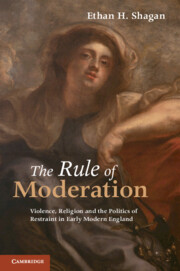1 - The bridle of moderation
from Part I - Moderate foundations
Published online by Cambridge University Press: 05 June 2012
Summary
Introduction: the bridle and the square
George Wither was a terrible poet. According to a seventeenth-century anecdote, Wither's writing was so infamous that when he was captured by royalists in the Civil War, the royalist gentleman Sir John Denham ‘went to the king and desired his majesty not to hang him’, on the grounds that as long as Wither lived Denham himself ‘should not be the worst poet in England’. Yet bad poetry is sometimes just blunt enough to make good history, so we begin with an emblem taken from Wither's Collection of emblemes, ancient and moderne (1635). Here, under the words ‘Do not the golden mean exceed / in word, in passion nor in deed’, we see the allegorical figure of moderation holding a horse's bridle in one hand and a carpenter's square in the other. The poem beneath tells us that, like a headstrong horse or mule, our nature is immoderate until ‘grace and reason come to govern us’. Then, explicating the emblem's imagery, Wither explains:
The square (which is an useful instrument,
To shape forth senseless forms) may represent
The Law: because mankind (which is by Nature,
Almost as dull, as is the senseless creature)
Is thereby, from the native-rudeness, wrought;
And, in the way of honest-living taught.
The bridle (which invention did contrive,
To rule and guide the creature-sensitive)
May type forth Discipline; which, when the law
Hath schooled the wit, must keep the will in awe.
And he that can by these his passions bound,
This emblem's meaning usefully hath found.
Here, moderation is anything but peaceful; it is an active force of both moral and legal control. The alliance of internal and external moderation – between the ethical moderation of reason and grace to keep the ‘passions bound’ and the external moderation of law to restrain and civilise human beings in their words and deeds – is precisely the point of the emblem. They are symbiotic: once law has schooled the wit, discipline keeps the will in awe.
- Type
- Chapter
- Information
- The Rule of ModerationViolence, Religion and the Politics of Restraint in Early Modern England, pp. 30 - 68Publisher: Cambridge University PressPrint publication year: 2011
References
- 2
- Cited by

